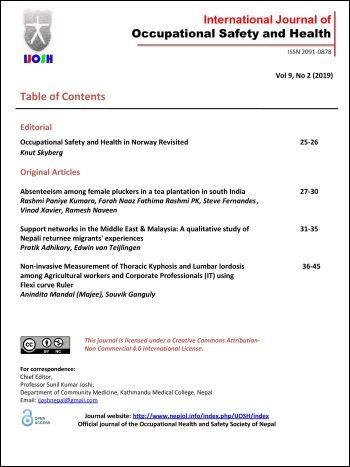Support networks in the Middle East & Malaysia: A qualitative study of Nepali returnee migrants' experiences
DOI:
https://doi.org/10.3126/ijosh.v9i2.25998Keywords:
Labour; Migration; social capital; interviewsAbstract
Background: There is growing research on Nepali migrant workers, especially on living conditions and occupational health and safety abroad. However, few studied support networks for migrant labourers. Objective of this study is to explore social support and support networks among Nepali migrant workers in the Middle East and Malaysia.
Methodology: Study among Nepali men working in the Middle East and Malaysia. Twenty in-depth interviews were conducted and the interviewees were mixed in terms of age, marital status, education, ethnic background and length of stay. Qualitative data were analysed thematically.
Results: The participants found that having (pre-)existing circles of friends in the host countries makes migration easier to migrate, and made their lives easier when establishing themselves abroad.
Conclusion: The assimilation of migrant workers appears to be easier among those who have existing networks in their place of migration. Social Capital Theory helps explain the importance of these networks.
Downloads
Downloads
Published
How to Cite
Issue
Section
License
This license enables reusers to distribute, remix, adapt, and build upon the material in any medium or format for noncommercial purposes only, and only so long as attribution is given to the creator.





